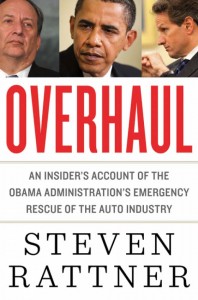
Few escape criticism from former auto czar Steve Rattner in his tell-all about the GM and Chrysler bailouts.
Steve Rattner isn’t known for being soft-spoken, and he proves it in his new book, “Overhaul,” an insider’s look at the desperate – and highly controversial — effort to save General Motors and Chrysler with more than $60 billion in federal bailout money.
While Rattner downplays the legal problems he’s run into since leaving the White House auto task force, he dishes on virtually everyone he dealt with during his six-month stint, from President Barack Obama to the man who just this week took over as GM’s fourth CEO in less than two years, Dan Akerson.
The bailout of the two Detroit makers actually began during the waning days of the Bush Administration. But once Congress made it clear it wouldn’t authorize the money needed to keep GM and Chrysler afloat, the politically-charged football was tossed into the lap of the new president.
It landed there only a week after the November 2008 election, and at the first sit-down with his advisors where the topic was broached, Barack Obama wasn’t exactly in Detroit’s court. “Why can’t they make a Corolla,” the President-elect asked.
If anything, Obama is portrayed as a calm and level-headed boss by “Overhaul,” Rattner writing that the president “had the air of a man in the business of calmly executing.” One of the more colorful descriptions the one-time auto czar offers up is the image of the “T-shirts and jeans worn by unshaven, sockless men,” debating what to do next during weekend meetings at the Oval Office.
If the new president made any mistake, writes Rattner, it was in letting the Bush Administration remain in control until the January 2009 inauguration. This “one president at a time” strategy, contends “Overhaul,” delayed the work of saving GM and Chrysler and cost countless millions.
Though critics often claim that the Obama Administration is beholden to the unions that lent it strong support, Rattner’s tome suggests otherwise. In particular, Rahm Emanuel, the fiery former congressman and Obama chief-of-staff, once quipped “F*** the UAW,” in reference to the union representing Detroit autoworkers.
Speaking in the first person, Rattner flatly declares that “no one in the Obama administration ever asked us to favor labor for political reasons.”
That didn’t mean Emanuel and others were willing to ignore public opinion or political expediencies, of course. Polling data was often consulted in the process of working up a bailout, and the Administration kept an eye on lawmakers who represented states and districts where Chrysler had a presence.
If the Obama Administration was less than friendly to the United Auto Workers Union, Rattner reveals the open level of hostility between the White House and former GM Chairman and CEO Rick Wagner. The president himself publicly criticized the turnaround plans crafted under Wagner’s watch and ultimately forced the executive out in return for the desperately-needed bailout.
After his March 31, 2009 departure, Wagoner would up collecting a $7.1 million check from GM. That was little more than a third of what the one-time college basketball star claimed his contract stipulated, but it clearly grated on the president himself, Rattner reports.
“Overhaul” was a work in process almost to the day early review copies began circulating. That allowed Rattner to put together a book with nearly the currency of a weekly news magazine. For one thing, he uses his platform to express his clear disappointment with Ed Whitacre, the former AT&T boss who took over as GM chairman following the bankruptcy – and then named himself CEO after firing Wagoner’s initial replacement, Fritz Henderson, last November.
“Big Ed,” as he is often known, had promised “to see GM through its initial public offering,” notes Rattner, but instead announced his retirement the same day the automaker filed the necessary paperwork for the IPO with the Securities and Exchange Commission.
New chief executive Dan Akerson also takes a sharp elbow from Rattner because he has decided to keep both CEO and Chairman titles, posts the former auto czar had hoped to see split up.
While the Administration’s handling of the overall economy is under fire, Rattner doesn’t join the chorus of nay-sayers. Quite the contrary, especially when discussing the Treasury Department. “Contrary to what some Americans may think,” writes Rattner, “the Treasury is blessed with a large array of talented and dedicated staff members.”
The 58-year-old Rattner himself is facing some serious problems these days as the result of the payment of $1.1 million to a placement firm to help win himself business with state pension funds. He continues to proclaim his innocence, insisting he has “never been accused of so much as jaywalking,” but those looking for more on the scandal will have to read elsewhere.
“Overhaul” was written with the assistance of several journalists, including a Fortune magazine editor, as well as a Team Auto colleague. It is due in bookstores and online distribution channels next month.

